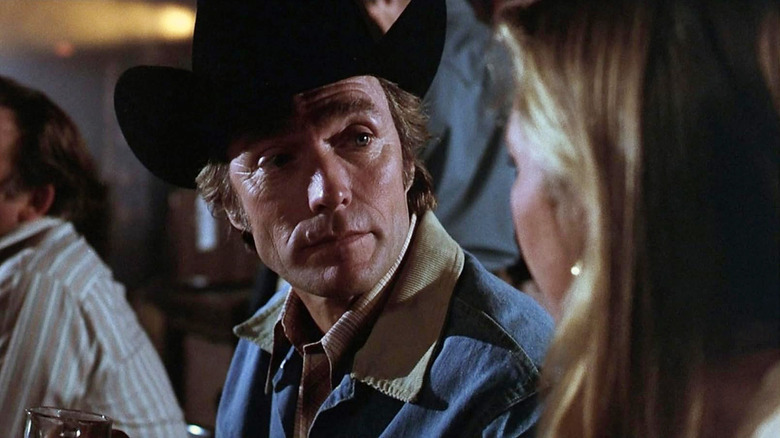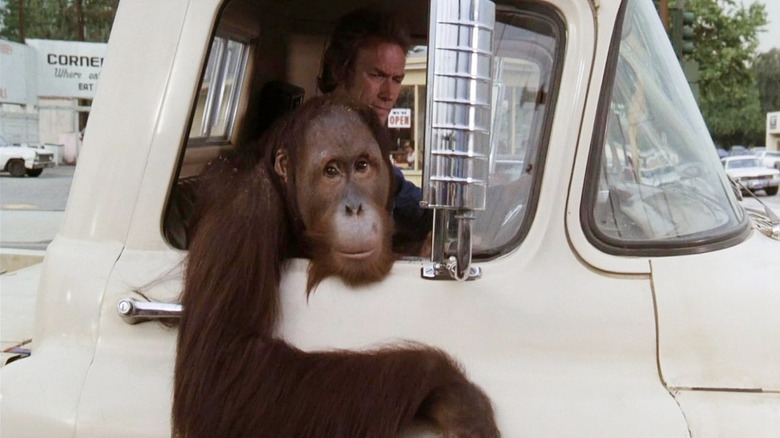Clint Eastwood's Agent Felt This Box Office Hit Wasn't Right For Him (But They Were Wrong)
The New Hollywood era of American cinema stretched from the late 1960s to the early 1980s, when Michael Cimino's infamous flop, "Heaven's Gate," scared the studios away from taking high-risk gambles on auteur-driven movies. During its peak, filmmakers like Francis Ford Coppola, William Friedkin, and Steven Spielberg gave us groundbreaking films that packed theaters across the country. Movie to movie, studio honchos were unsure of what would catch on with audiences; all they knew for sure was that pricey soundstage musicals and traditional Westerns not starring John Wayne (and even then) were generally poor investments.
When we discuss the New Hollywood movement, we don't often bring up Clint Eastwood. He entered the 1970s as a major movie star and sent his commercial value skyrocketing with Don Siegel's violent blockbuster "Dirty Harry." There wasn't a safer bet in the 1970s than Eastwood, but near the end of the decade, the future Mayor of Carmel-by-the-Sea, California, grew concerned that he was becoming a humorless, one-note tough guy whose movies were inappropriate for younger viewers. So, when ran across Jeremy Joe Kroenberg's screenplay for "Every Which Way But Loose," which related the boozy, knockabout adventures of bare-knuckle fighter Philo Beddoe and his mischievous orangutan buddy Clyde, Eastwood leapt on it — to the consternation of just about everyone in his orbit, including his agent.
Kroenberg's script had been passed on by multiple studios by the time Eastwood became aware of it, so it's understandable that his agent, home studio (Warner Bros.), and anyone else aboard his gravy train would wave him off the movie. Be that as it may, they wound up with a hatchery full of egg on their faces when the film grossed $104 million at the box office against a $5 million budget. What did Eastwood know that they didn't?
Every Which Way But Loose is an Eastwood-style comedy for the whole family
It was really the not-knowing that scared off most of Eastwood's team. With very few exceptions (most notably John Sturges' Western misfire "Joe Kidd"), the star was on a decade-long winning streak. But, as Eastwood told The Guardian in 2003, he saw the rowdy, low-aiming comedy as an opportunity. "That was a film my agent and everyone else begged me not to do," he explained. "This is after 'Dirty Harry,' and I'd done a lot of action and adventure films, and they said, 'That's not you,' and I said, 'Well, what is me? I don't know.' To me it was about reaching out to a younger generation, making a movie that kids could see, with a little less mouth." By "mouth," I believe Eastwood meant "profanity," though, as a child, I remember my mother objecting to the rough language when I watched it over and over again on pay cable.
Eastwood's instincts were obviously spot-on (the 1970s were also a golden age for redneck movies). The blockbuster success of "Every Which Way But Loose" led to a smash hit sequel, "Any Which Way You Can," which grossed $71 million at the domestic box office against a $15 million budget. But when Kroensberg tried to cash in sans Eastwood with 1981's "Going Ape!," moviegoers decided that "Taxi" stars Tony Danza and Danny DeVito messing around with three orangutans wasn't enticing enough (eight-year-old me thought it was a blast), and thus the New Orangutan era of American cinema to a close. I always wanted Eastwood to apply his career revisionism to these crucial films in his filmography, but I can't imagine a 95-year-old director wanting to mix it up with apes nowadays, especially after the commercial failure of Robbie Williams' chimpanzee-centric biopic "Better Man."

